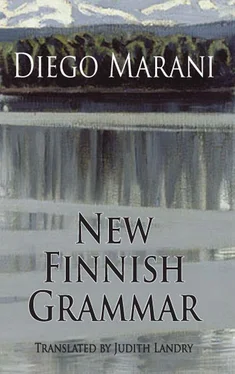Now I started running: away from the sea, into the densest tangle of streets, where I wandered like a madman. It seemed to me that the whole city was reading that name as it was paraded around the bay on the ship’s hull, that the journalists from the Kämp, the nurses in the hospital, even the sick and wounded, had gone down to the shore to take a good look at it, and that they were now marching threateningly towards me, demanding an explanation. Now the black crowd was driving me back into that same sea by which I had arrived that distant winter morning: they were fending me off, they were rejecting me. They were punishing me for having deceived them. I could not make out their faces, all I saw was the odd profile, part of a face, a snarling mouth, an outstretched leg, a raised arm. Some were shrieking, others were responding with a raised fist. A hand would seize me, trying to knock me to the ground, another would grab me by the collar, shouting: ‘Who are you?’ I wandered around the city, no longer recognizing it, no longer distinguishing what I was imagining from what I saw. I jumped with fright at every approaching passer-by, I peered about me, frightened that I was going to be attacked. I drifted around in a daze, taking streets I’d never seen before. The blood beat in my temples, my eyes throbbed, my hands trembled. Anguish was slowly taking over, paralysing my every action, choking down my every thought. It began to rain, a monotonous downpour, without thunder or lightning, which drowned out all other sounds. The city could breathe at last; I too heaved a sigh of relief. The clouds above me seethed and swelled, seemed to be ever growing. A quiet earthquake was shaking skies where, during those long days of heat, a bewitched city had grown up, an evil mirror of the real one, made up of fog and clouds. I walked the streets dreaming that the warship too was part of that diabolical double game, that the rain would carry it away as well, and that the white letters of its name would dissolve like a mirage over the distant sea.
The cold water on my skin, my eyes, my face, lessened my terror somewhat; I felt its coldness running down my every limb, soothing and washing my wounds. I recognized the Bulevardi, went as far as the Esplanadi, then reached the hospital, still in the pouring rain.
I have been here all day, seated on my bed in the visitors’ quarters, finishing writing these last pages. I have not been to mass, nor to the refectory; I have neither eaten nor drunk. It is late now; another night without darkness has fallen over the city. Now my mind is made up: I shall leave for the front at dawn with the first troop train. Over all these months I have believed that I was someone I am not. I have looked among these people for my race, my kith and kin; I have learned the language in which I thought I had once called my mother, but whose sounds in fact had maybe never issued from my mouth. I shall never know in which language my mother sang me her lullabies. My language — my real language — is lost for ever. It slipped away, together with my memory; seeped away into the sea, together with my blood, that night on the wharf in Trieste. Perhaps my memories are drifting around in the oceans like unnoticed oil slicks, perhaps the waves are carrying them to some distant beach where they will be scattered, or sink into the sand like foam. If I had not gone down into the port that morning, perhaps I would never have known the truth; or perhaps that moment would simply have been delayed, who knows by how long. I might have lived for another fifty years without ever coming across the ‘Sampo Karjalainen’. One day, in some distant future, when I was old and tired, I might perhaps have been able to accept the truth as a joke played on me by destiny. A whole life lived inside a wrong name makes it the right one, turns falsehood into truth. Two steps away from death, I would have laughed in the face of anyone who had come to tell me that I was not Sampo Karjalainen. More probably, though, the relentless burden of unease which I had borne ever since my awakening on board the Tübingen would have grown heavier over time, would have crushed all my efforts to find myself a life. No country would have felt like home. Even when I was at my most convinced that I would indeed be able to rediscover my past, I often had the feeling that I was moving in the wrong direction. Such faint traces of myself as I did occasionally come upon in my ravaged mind led elsewhere; and yet, as soon I began to follow them, they became indistinct. Perhaps I should never have taken up Doctor Friari’s suggestion, never have thwarted the fate which had taken me to Trieste. That was my path, and I have strayed from it. I had the gall to make a choice; but in this world we have no choices. Or perhaps my destiny was precisely this: to come all this way, to learn Finnish, to become a Finn, even if I have never really become one. All in all, by now I owe this country everything; or rather, I owe it such little as I have managed to become. Without even knowing who I was, without asking for anything in exchange, it lent me a name, a language. In its hour of need, it took me in; all it required to be accepted, to be recognized as one of its own, was a name tape sewn into a sailor’s jacket. A letter from an unknown doctor in the German army was enough to ensure me a bed and a succession of hot meals. So, because I am called Sampo Karjalainen, and because I speak Finnish, I shall go and fight for this country at dawn, and if I have not succeeded in being a real Finn in life, at least I shall be one in death. On the cross which they will place upon my grave, the name I bear will at last be mine. Mine alone; completely mine. I am leaving you my story, reader, so that you will make a memory of it. In this way I, who will live on in no one’s memory, who, when alive, never existed, will be able to die hoping to be remembered.
Here Sampo Karjalainen’s manuscript comes to an end. The notebook itself has several more pages, with various telephone numbers, addresses and the names of some places in Southern Karelia. Folded into the notebook I also found a plan of the City of Helsinki, torn out from a telephone directory, and a few tram tickets. Between the last page and the cover is a pressed leaf, probably from a service tree, which has left a green mark on the paper. Ilma Koivisto claims that it is a leaf from the tree of happy memories. The cover bears the initials S.K., in Indian ink, similar to those embroidered on the handkerchief which was found together with the manuscript. War Office file n. 37895 tells us that private Sampo Karjalainen, who enlisted as a volunteer on 24 June 1944 and was assigned to the third division of the frontier guards, fell in the battle of Ihantala, but there is no mention of where he is buried. Perhaps he lies not far from his only friend, the Pastor Olof Koskela, in some mass grave beside the road to Mustamäki. Perhaps he was crushed beneath the tracks of a tank, and nothing of his body now remains. No one knows how the author of this manuscript met his death — this man whom I decided should be called Sampo Karjalainen. I, today, know who Sampo Karjalainen really was; that is why I have come to Helsinki to look for him: to make up for my wretched mistake, to give him back, if not his memory, at least his true identity and a place to which he can return. But the war carried me far away from him, prevented me from reaching him in time. Only today have I been able to accomplish my mission, and now it is too late.
While we were still anchored off Trieste, a few days after the departure of the convoy which took Sampo Karjalainen towards his death, Doctor Friedrich Reiner came in person to call on me on board the Tübingen. It was the evening before we set sail for North Africa. The sailors were making the final adjustments by the light of the ship’s lanterns. A strong bora was blowing, hurling itself upon the ship with all its force; the autumn sky was filling up with clouds, glowing pink in the light of the setting sun. I was lying low in my study when the watch officer informed me of the doctor’s arrival. The gust of wind that entered the room with him was as chilling as the news that he brought with him. He placed a package on the table — it was tied up with shoe laces, and wrapped up in a blue-striped pocket handkerchief with the initials S.K. embroidered on the edge — then proceeded to undo it with a solemn air. It contained a military identification tag engraved with the name Stefan Klein and the number 97840028, an empty wallet, an Italian railway ticket and a piece of crumpled paper, folded into four. On inspection, this turned out to be a document issued by the Italian navy, granting a fortnight’s special leave, starting from 7 September 1943, to the soldier Massimiliano Brodar, born in Trieste on 6 December 1916 and resident in Via San Nicolo 10. Noting my bewildered expression, Doctor Reiner unbuttoned his greatcoat and began to explain.
Читать дальше












